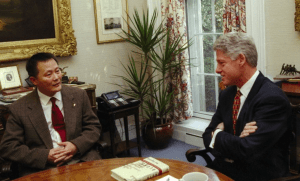Journal of Political Risk, Vol. 7, No. 6, June 2018

Troops pose with the “Laser Kiwi” flag, submitted to the New Zealand Flag Consideration panel in 2015 by James Gray. Source: Reddit.
Bernard Cadogan, Ph.D.
Foreign Affairs and Diplomatic Advisor to King Tuheitia, the seventh King of the Maori Kiingitanga
Address to the U.K. Defence Academy, Shrivenham, 7th February 2018
New Zealand is proof that nature does not always abhor, a vacuum. The country is truly, “the last, the loneliest and the loveliest” as Rudyard Kipling declared Auckland to be in his “Song of the Cities”. Strategic systems never tolerate vacuums. They punish confusion and ambivalence. New Zealand is no redoubt, nor is it overlooked.
The intention of this address is to consider New Zealand’s sense of geopolitical reality. Are we proof that the Versailles Conference unassociated Organisation for Economic Co-operation and Development (OECD) nation state has been outclassed in the 21st century Pacific? Are we a living fossil ?
Woodrow Wilson envisaged a world in which there would be no assemblages such as empires, nor alliance systems even. Sovereignty-pooling exercises such as the European Union and Mercosur or Caricom would have been anathema to Wilson. They are not an option for us.
When asked at the Versailles Conference, why we had made the effort we did in the Great War, our Prime Minister Bill Massey replied, “we did it for Civilisation”.




